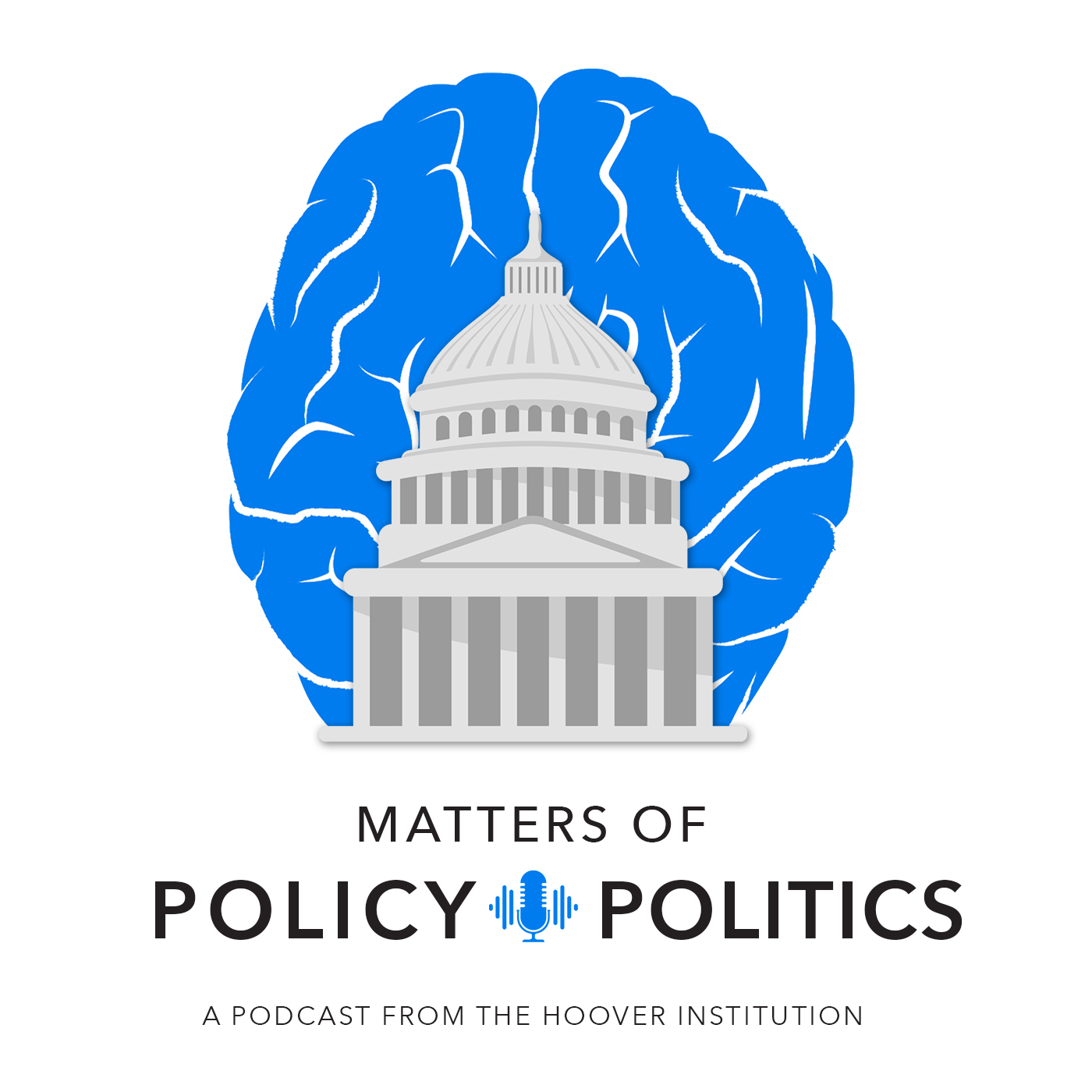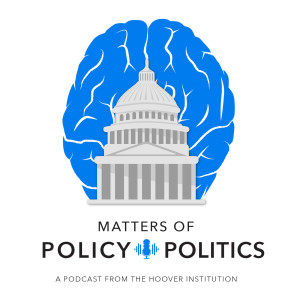
1.8M
Downloads
410
Episodes
Matters of Policy & Politics is a Hoover Institution podcast devoted to matters of governance and balance of power at home and abroad. It is hosted by Hoover fellow Bill Whalen.
Matters of Policy & Politics is a Hoover Institution podcast devoted to matters of governance and balance of power at home and abroad. It is hosted by Hoover fellow Bill Whalen.
Episodes

Thursday Aug 22, 2024
Thursday Aug 22, 2024
As Kamala Harris attempts to succeed where fellow Californian Richard Nixon fell short in 1960 – win the White House as a sitting vice president amidst a complicated economy – she takes a page from the Nixon presidency and wades into what government can do about the high cost of goods and services (specifically, food prices). Economist David Henderson, a Hoover Institution fellow and a I Blog to Differ commentator, explains what Nixon attempted a half-century ago and what Harris suggested in her pre-convention economics address. Henderson also explains the difference between price controls and curbing price-gouging plus the economic consequences of the federal government imposing its will on the free market.

Friday Aug 16, 2024
Friday Aug 16, 2024
For the past two weeks, after Hezbollah rockets struck a Golan Heights town and Israel forces retaliated with strikes on targets in Beirut and Tehran, the world is bracing for further violence in the Middle East, fearing the conflict will escalate into a regional war. Meanwhile, the Biden Administration presses for a cease-fire agreement in Gaza.
Hoover Institution fellow Cole Bunzel, who studies history and contemporary affairs of the Islamic Middle East, makes sense of Iran’s retaliatory timeline, discusses Israel’s options both militarily and diplomatically, and notes that a lame-duck American president (again) is trying to broker a Middle East peace arrangement amidst an election year; plus the prospects of a “mega” deal involving a US-Saudi bilateral treaty, Saudi-Israeli normalization, and possibly a road to Palestinian statehood.

Thursday Aug 08, 2024
Matters Of Policy & Politics: Hoover At 150
Thursday Aug 08, 2024
Thursday Aug 08, 2024
On August 10, celebrants will gather in West Branch, Iowa – Herbert Hoover’s birthplace, resting place, and home to his presidential library and museum – to celebrate the great man’s 150th birthday. Hoover biographer George Nash, who’ll be part of a panel discussion that day, discusses a remarkable 90-year life journey that took America’s future president from a nascent Stanford University to international mining ventures, to famine relief in Western Europe and the Soviet Union, and a post-presidency devoted to political philosophy and a “crusade against collectivism.” Nash also discusses Hoover’s sometimes complicated relationship with seven American presidents over the last 50 years of his life – and, along the way, finding time to establish an institution that bears his surname.

Tuesday Jul 30, 2024
Tuesday Jul 30, 2024
For the first time in 40 years, a Californian is set to become a major party’s presidential nominee. Meanwhile, governor Gavin Newsom issues an order to remove homeless encampments from city streets and continues to push back against critics of California’s $20 minimum wage for fast-food workers who claim that the new standard is a job-killer. Hoover senior fellow Lee Ohanian and distinguished policy fellow Bill Whalen, both contributors to Hoover’s California on Your Mind web channel, discuss the Golden State including why vice president Kamala Harris’ ascent to the top of the Democratic presidential ticket upsets the political order in her home state (would Newsom accept a cabinet post should she win?), plus upcoming milestones for two US presidents with California ties – the 50th anniversary of Richard Nixon’s White House resignation and Herbert Hoover’s 150th birthday.

Wednesday Jul 03, 2024
Matters Of Policy & Politics: Supreme Concerns
Wednesday Jul 03, 2024
Wednesday Jul 03, 2024
The Supreme Court saves the year’s most dramatic case for last – the question of whether Donald Trump can claim immunity from prosecution for actions he took while holding office. John Yoo, a Hoover Institution visiting fellow and Emanuel S. Heller Professor of Law at the University of California–Berkeley School of Law, dissects the court’s highly anticipated ruling. After that John talks about the significance of American’s Independence Day celebration, the health of the US Constitution, plus the proper balance of freedom and regulation – from the perspective of a constitutional scholar and a first-generation American.

Monday Jul 01, 2024
Monday Jul 01, 2024
Is a Chinese move on Taiwan inevitable (a quarantine, embargo or outright invasion this decade or next)? Or are there commonsense ways to ensure the island country’s freedom—and prevent a great-power conflict between Cold War rivals? Matt Pottinger, a Hoover Institution distinguished visiting fellow and former senior staffer at the White House’s National Security Council, joins Hoover Distinguished Policy fellow Bill Whalen to discuss the options he and other US-Sino experts have to offer in Hoover’s newly released The Boiling Moat: Urgent Steps to Defend Taiwan. Among the recommendations: ramping up military technology and capabilities; introducing a new pro-military mindset on the other side of the Pacific Rim; plus, America (following Israel’s example) understanding the benefits of a “warrior ethos.”

Thursday Jun 06, 2024
Thursday Jun 06, 2024
While the Golden State struggles with the aftershock of its elevated fast-food minimum wage – California-based Rubio’s Coastal Grill, home of the fish taco, is filing for bankruptcy – and the legislature has to deal with the approaching deadline for a new state budget, which invites fiscal and policy skullduggery. Hoover senior fellow Lee Ohanian and distinguished policy fellow Bill Whalen, both weekly contributors to Hoover’s California on Your Mind web channel, discuss the latest news in the Golden State including a nascent 2026 governor’s race (will vice president Kamala Harris “pull a Nixon” and give it a go?), plus a fond remembrance of the late Bill Walton – native San Diegan, UCLA basketball legend, citizen activist – who passed away just days after his beloved Pac-12 Conference likewise bid farewell.

Friday May 17, 2024
Friday May 17, 2024
President Biden and Donald Trump have agreed to a departure in presidential politics – two general-election debates in late June (a historical first) and early September, with a lone vice presidential debate somewhere in between. Ben Ginsberg, the Hoover Institution’s Volker Family Visiting Fellow and a nationally recognized election-integrity advocate and campaign counsel, discusses the merits of the new debate schedule, what it means for the future of the Commission on Presidential Debates (which both candidates purposely avoided) and national conventions and third-party candidacies, the impact on a changing media landscape, plus the feasibility of a third Biden-Trump debate in October if either the public demands or both campaigns feel compelled to do so.

Friday May 10, 2024
Friday May 10, 2024
Did a preeminent California university handle campus protests the right way, and why can’t the state prove that its homeless programs are working? Hoover senior fellow Lee Ohanian and distinguished policy fellow Bill Whalen, both contributors to Hoover’s “California on Your Mind” web channel, discuss the latest news in the Golden State including third-party candidate Robert F. Kennedy Jr. qualifying for California’s November ballot, a fast-food wage hike that continues to cause economic heartburn, and Governor Gavin Newsom’s return to wanderlust (this time, a mid-May sojourn to the Vatican to preach about the perils of climate change).

Monday Apr 29, 2024
Monday Apr 29, 2024
What happened to teamwork and the spirit of unity and common purpose – not just in sports, but in politics and in society? Former New Jersey senator and basketball legend Bill Bradley, the star of the one-man show Rolling Along, tells a tale that took him from a Missouri boyhood to a celebrated turn at Princeton, the bright lights of New York’s Madison Square Garden, and nearly 25 years in politics, followed by a post-political segue to academia, finance, and “story-telling.”
